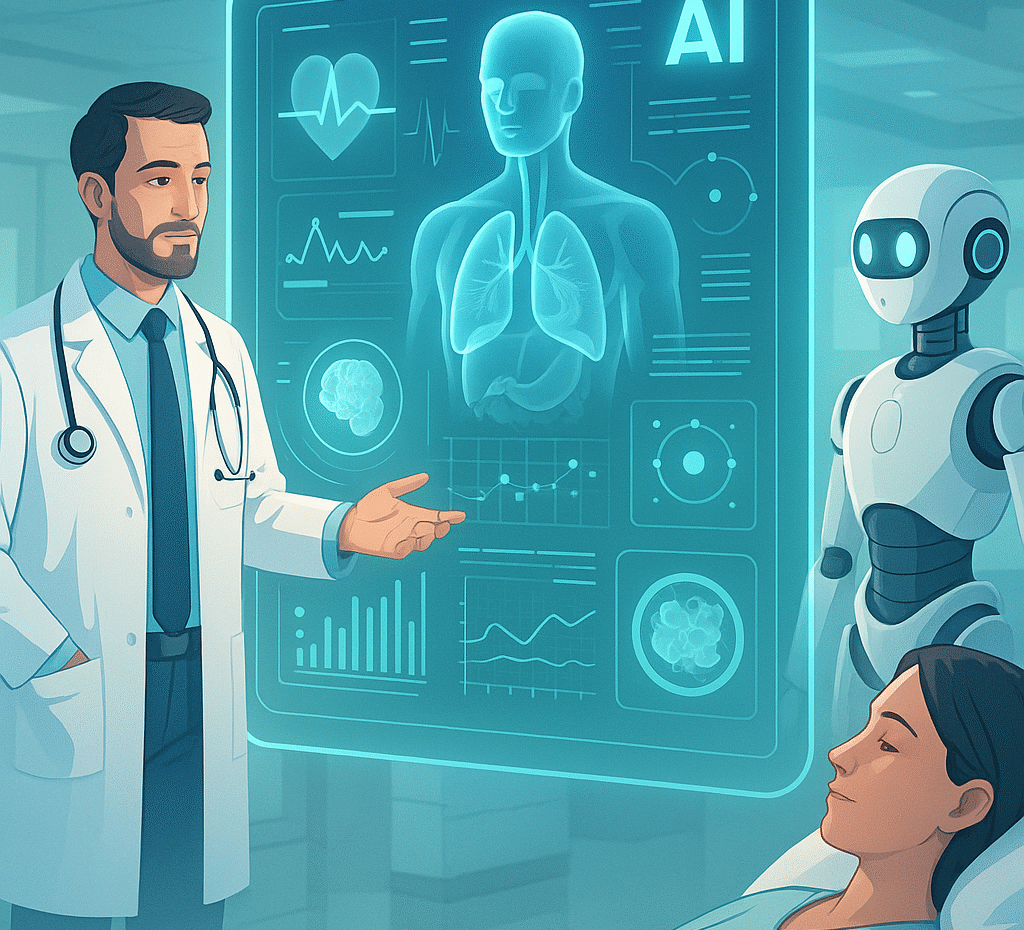- June 12, 2025
- by admin
AI in Healthcare: Revolutionizing Diagnosis and Treatment
Healthcare is experiencing a revolution not driven by new medicines or surgical tools, but by algorithms and data. Artificial Intelligence (AI), once a buzzword in tech circles, is now transforming the front lines of patient care. From diagnosing rare diseases in minutes to predicting patient outcomes before symptoms appear, AI is not just assisting healthcare professionals it’s empowering them.
As the industry faces mounting pressure from rising costs, staff shortages, and growing patient expectations, AI is offering unprecedented support in improving accuracy, efficiency, and access.
But how exactly is AI changing the landscape of diagnosis and treatment and what does this mean for healthcare providers and patients alike?
Let’s explore the reality of AI in healthcare today and where it’s headed.
🔬 The Power of AI in Diagnosis
Traditionally, medical diagnosis has relied heavily on clinical experience, pattern recognition, and time-consuming lab work. AI is helping to augment this process with speed and precision.
1. Medical Imaging and Radiology
AI-powered tools can now analyze X-rays, MRIs, CT scans, and ultrasounds faster and in some cases more accurately than humans.
Google’s DeepMind has developed an AI system that can detect over 50 eye conditions with a performance comparable to world-leading ophthalmologists.
In breast cancer screening, AI systems have shown up to 9% increased detection accuracy while reducing false positives.
This doesn’t replace radiologists; it enhances their capacity, allowing them to focus on complex cases and spend more time with patients.
2. Early Detection Through Predictive Analytics
AI can sift through vast medical histories and real-time patient data to predict conditions before symptoms emerge.
IBM Watson Health has been applied in oncology to suggest treatment options based on genetic data and clinical trials.
Predictive models are being used in hospitals to forecast patient deterioration, sepsis, or risk of readmission improving care and saving lives.
This proactive approach is shifting medicine from reactive to preventive, unlocking better health outcomes and cost savings.
💊 AI-Enhanced Treatment Personalization
One of AI’s most promising contributions is the personalization of treatment plans.
No two patients are exactly alike and AI helps clinicians tailor treatments based on a patient’s unique medical history, genetics, lifestyle, and even preferences.
1. Precision Medicine
AI enables the analysis of genetic data to understand how an individual’s body responds to specific drugs or interventions.
For example, in cancer treatment:
AI models can match patients to the most effective drug therapies, reducing trial-and-error and minimizing side effects.
Tools like Tempus and Foundation Medicine are using genomic data to guide oncologists in selecting targeted therapies.
2. Robotic-Assisted Surgeries
AI is also making its way into the operating room. Robotic systems, powered by AI, assist surgeons with extreme precision and stability.
Da Vinci Surgical Systems use AI to optimize movement, reduce tremors, and improve accuracy.
AI algorithms guide surgeons with real-time insights from patient data and anatomical models.
These tools don’t replace surgeons but act as extensions of their expertise, reducing complications and speeding up recovery.
🤖 Virtual Assistants and Workflow Automation
AI-powered virtual assistants are easing administrative burdens in healthcare, freeing professionals to focus on patient care.
1. Voice-to-Text Documentation
Tools like Suki and Nuance DAX transcribe doctor-patient conversations and automatically generate clinical notes, reducing hours of manual documentation.
2. AI Chatbots and Symptom Checkers
AI assistants like Babylon Health or Ada help patients assess symptoms, schedule appointments, and access basic healthcare guidance reducing non-urgent hospital visits.
These tools improve access to information, especially in underserved regions, and help healthcare systems scale without burning out the workforce.
🧠 AI in Mental Health
Mental healthcare, often limited by stigma and resource constraints, is also being transformed by AI.
Sentiment analysis and natural language processing (NLP) help detect early signs of depression or anxiety through speech, writing, or behavior on social media.
AI-based mental health apps like Woebot use cognitive behavioral therapy (CBT) techniques to engage users and offer support 24/7.
While not replacements for human therapists, these tools can extend support and catch early signs of distress before they escalate.
⚖️ Ethical Considerations and Limitations
With great power comes great responsibility and AI in healthcare is no exception.
1. Data Privacy and Consent
Medical data is sensitive. AI tools must adhere to strict data protection regulations like HIPAA (US) or GDPR (EU), ensuring patient privacy is never compromised.
2. Bias and Accuracy
If AI is trained on biased or incomplete datasets, it can make incorrect or unfair decisions. This is particularly dangerous in diagnosis or treatment recommendations.
Developers and hospitals must audit AI tools regularly, ensure transparency, and include diverse data for training to minimize health inequity.
3. Human Oversight
AI should support, not override, human decision-making. Final responsibility must always lie with qualified healthcare professionals.
🌍 The Road Ahead: Collaboration, Not Replacement
AI is not here to replace doctors, nurses, or caregivers it’s here to empower them.
Healthcare is fundamentally human. Empathy, judgment, and ethical decision-making cannot be programmed. But AI can take over repetitive, analytical tasks giving professionals the time and tools to do what they do best: heal, comfort, and care.
Hospitals, startups, and governments must work together to ensure AI is adopted ethically, inclusively, and strategically, so every patient, regardless of geography or income, benefits from this revolution.
AI in healthcare isn’t just about faster diagnoses or smarter machines. It’s about building a future where care is more accurate, personalized, and proactive. A future where technology amplifies the human touch not replaces it.
For healthcare professionals, this is the moment to embrace innovation, upskill continuously, and become co-pilots in an AI-powered system.
For patients, it’s a promise of better, earlier, and more compassionate care.
Let’s build a world where every algorithm serves a life.

